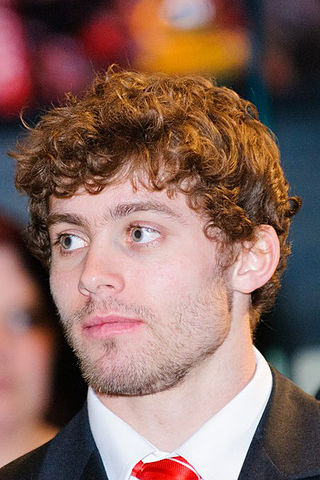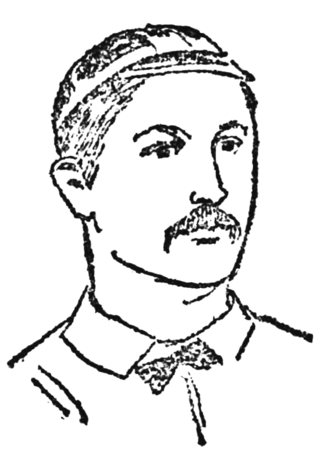
Arthur Joseph "Monkey" Gould was a Welsh international rugby union centre and fullback who was most associated as a club player with Newport Rugby Football Club. He won 27 caps for Wales,18 as captain,and critics consider him the first superstar of Welsh rugby. A talented all-round player and champion sprinter,Gould could side-step and kick expertly with either foot. He never ceased practising to develop his fitness and skills,and on his death was described as "the most accomplished player of his generation".

Christopher Douglas Paterson,MBE is an ambassador and specialist coach for the Scotland and Edinburgh rugby union teams. He is a former professional rugby union player who played for Scotland and,for the most part of his career,Edinburgh. Paterson is Scotland's record points scorer with 809 points and second most-capped player with 109 caps. He was capable of playing in a range of positions,including fullback,wing and fly-half.

Kenneth Jeffrey Jones OBE was a Welsh sprinter and record breaking Welsh international rugby union footballer. He played for both Wales and the British Isles. He is best known in Wales for his contribution to Welsh rugby,but most notably for his winning try against the All Blacks in 1953.
Thomas Cooper Graham was an England-born Welsh rugby union international forward who played club rugby for Newport. He won 12 caps for Wales and was seen as intelligent,mobile forward player. Graham is most notable within rugby for his captaincy of Newport,which saw the team through one of their most successful periods,including the 1891–92 "invincible" season.
The 1883 Home Nations Championship was the inaugural series of the rugby union Home Nations Championship. Five matches were played between 16 December 1882 and 3 March 1883. It was contested by England,Ireland,Scotland,and Wales.
Bernard Turnbull was a Welsh international centre who played club rugby for Cardiff and was capped six times for Wales. Turnbull has been described as a dogged and unimaginative centre,but with the ability to finish off the work of others. Turnbull captained Wales on one occasion in 1927.

Stephen Leigh Halfpenny is a Welsh rugby union player who plays as a fullback or wing for Harlequins in the English Premiership. Halfpenny is the third highest points scorer for Wales after Neil Jenkins and Stephen Jones.

Francis Escott Hancock was an English-born rugby union centre who played club rugby for Somerset and Cardiff and international rugby for Wales. Hancock is best known as being the sport's first fourth threequarter player,which changed the formation of rugby union play that lasts to the present day. His role in the development of rugby was recognised by the International Rugby Board in 2011 with induction to the IRB Hall of Fame.

Frank Hill was a Welsh international rugby union forward who played club rugby for Cardiff. Hill won 15 caps for Wales over a period of ten years and was given the team captaincy on four occasions.

William James Wood "Buller" Stadden was a Welsh international rugby union half back who played club rugby for Canton,Cardiff and Dewsbury. Stadden won eight caps for Wales over a period of seven years and is most remembered for scoring the winning try in 1890 to give Wales their first victory over England. He committed suicide in Dewsbury after murdering his wife.
William David Phillips was a Welsh international rugby union forward who played club rugby for Cardiff Rugby Football Club and international rugby for Wales. He won five caps for Wales and would later become a central figure in the early history of the Welsh Rugby Union.
Dolway Bell Walkington was an Irish rugby union player and solicitor. Walkington played club rugby for North of Ireland FC and international rugby for Ireland,winning eight caps. Although captaining Ireland twice,he is more often remembered for his poor eyesight and the fact that he occasionally wore a monocle while playing,removing it when required to make a tackle.
Edward John Roberts was a Welsh international rugby union fullback who played club rugby for Llanelli and international rugby for Wales.
Andrew Ramsay "Bunny" Don-Wauchope was a Scottish international rugby union back who played club rugby for Cambridge and Fettesian-Lorettonian. Don Wauchope played an important role within the early growth of Scottish rugby and after retiring from international rugby he became a referee and was the President of the Scottish Rugby Union. He was considered Scotland's outstanding half-back of the early 1880s and is credited as being one of the pioneers of modern half-back play.
Harry Vaughan Watkins was a Welsh rugby union player who played club rugby for Llanelli and London Welsh and gained six caps for the Wales national team. Watkins also played cricket and hockey for Carmarthenshire.

Elliot Kear,is a Welsh professional rugby league footballer who plays as a wing,centre or fullback for the Batley Bulldogs in the RFL Championship and Wales at international level. He is now the record 2nd all time Welsh cap holder with 34 caps.
Thomas Henry Evans was a Welsh international rugby union flanker who played club rugby for Llanelli. Evans played in eighteen international games for Wales,and in 1908 was part of the Welsh team that faced touring Australian team. Evans played in four Home Nations Championships,from 1906 to 1909,and the first two Five Nations Championships,in 1910 and 1911;playing in three Triple Crown winning seasons.

Aloysius Mary "Louis" Magee was an Irish rugby union halfback. Magee played club rugby for Bective Rangers and London Irish and played international rugby for Ireland and was part of the British Isles team in their 1896 tour of South Africa.

Charles Gurdon was an English barrister,judge,rower and rugby union forward who played club rugby for Cambridge University and Richmond. Gurdon represented England fourteen times during the early development of international rugby union,once as captain. He and his brother Edward Temple Gurdon formed one of the most notable sibling pairings in English rugby.

Ross Moriarty is an international rugby union player,who currently plays for Brive. Moriarty has represented Wales and England U20.











